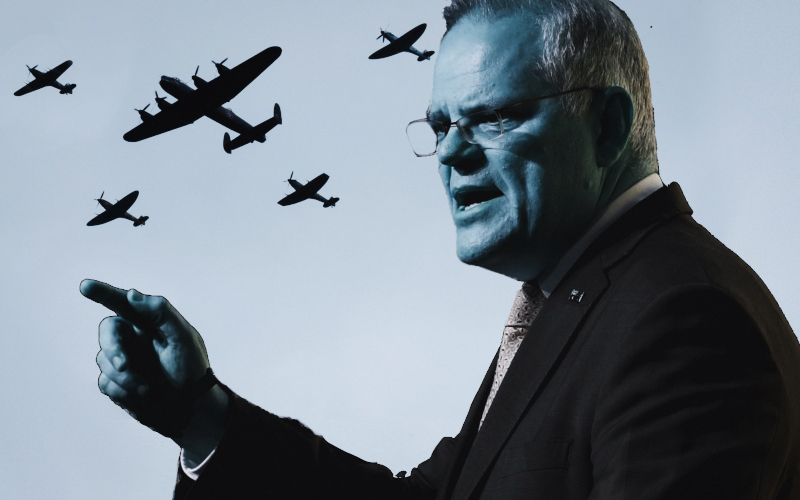The power to send Australian troops to fight in foreign wars rests in effect with the Prime Minister alone, yet a huge majority of Australians think parliamentary approval should be required. Alison Broinowski reports.
Australia has only just begun to extricate itself from the two decades-long war in Afghanistan. But already government ministers and some senior public servants have started beating the drums of war, this time against China.
Will the Australian public ever be given a true reckoning of the appalling costs of endless war, not only in lives lost but also financially? Of the spending on fighting wars that means less money for health, education and social services?
Moreover, it is well past time for legislation to ensure that the power to send troops into foreign wars does not rest with the Prime Minister alone. Given the power and extraordinary profitability of the US military industrial complex, which relies on constant war, parliamentary oversight of such a momentous decision is critical.
The cost to Australia of war in Afghanistan from 2001 to 2021 was $10 billion. The cost of Australian involvement in Iraq, projected at $700 million in 2003, rose to more than $5 billion in 2021.
Military industrial complex is thriving
In the US the ‘military-industrial complex’ which President Eisenhower saw emerging from World War II, is thriving, to the delight of the weapons industry. The ‘war on terror’ launched by the Bush Administration led to a surge in funding beginning in 2001.
By late 2019 $US6.4 trillion had been spent on wars, directly causing the deaths of at least 801,000 people, not including those in Syria. The US military was engaged in fighting terrorism in 79 countries, 39 per cent of the world’s nations.
Between 2002 and 2017 the US spent $US2.8 trillion on the war against terror and on counter-insurgency wars in Afghanistan, Iraq, and Syria – equivalent to 16% of the US discretionary budget. In March 2019, President Trump proposed to spend $US750 billion on the military, and Congress approved. Global military spending rose to $US1917 billion, its largest increase since 2010. President Biden has not proposed reducing it.
Australian spending surges
And with America urging us to do more, in the two decades following the 9/11 attacks, Australia’s security spending expanded by unheard-of proportions. The Defence Department budget increased by 291 per cent, ASIO’s by 528 per cent and ASIS’s by 578 per cent. Just last year Prime Minister Scott Morrison announced military expenditure of A$270 billion, including on missiles that could reach China, and cooperation with the US in militarising space.
Re-announcing all this in March 2021, he listed US and UK arms manufacturers as potential industry partners. They are among the prominent sponsors of the Australian War Memorial, and donors to the Australian Strategic Policy Institute.
Yet still the decision to go to war rests in effect with the Prime Minister alone. The Prime Minister does not have to consult Parliament before sending Australian troops into armed conflict abroad.
Last September a Roy Morgan poll found that 83% of respondents believed parliamentary approval should be required. However, the major political parties are refusing to budge on the issue.
Australians for War Powers Reform, a small, mostly volunteer organisation, has launched a GoFundMe campaign Be Sure on War to put pressure on political parties to act.
Australia inextricably linked with US
With the profits of multinational weapons companies so closely linked with the imperative to go to war, powerful checks and balances are vital around making that decision. This includes legislation requiring parliamentary approval for entering armed conflict overseas, so that Australians can have proper debate, scrutiny and a critical appraisal of the decision.
As Professor Richard Tanter has argued, so inextricably involved is Australia with US defence policy and industry that we will be unable to stay out of future American wars.
If we want to know where our future lies as we march in lock-step with the US, we only need to look to history as our guide.
In the 19th century the US fought in 18 international conflicts, roughly one every five years. In the 20th century, that grew to 38 wars, or one every three years. Since 2000 the US has fought 10 wars, the equivalent of one every 1.7 years.
In the 67 years to 2018, the US has attempted regime change in 58 separate instances, the equivalent of one every 14 months, according to calculations by Professor Camilleri.
America a ‘warfare state’
While America advocates an international rules-based order, it does not observe it, with US administrations overthrowing or trying to overthrow 14 governments during the 1950s and 12 governments during the 1960s. The US is still doing it, or trying to.
American themselves have warned about a ‘warfare state’ but that has not stopped the military-industrial complex from growing, and the US now has a monstrous military establishment costing $1 trillion a year, bigger than the world’s next eight nations combined.
In most of the American wars, the UK and Australia were willing allies, both bound by unannounced principles that equated the national interest with global commerce, backed by military force.
The profitability of the military mega-industry has been rapid. Since 2001 the many trillions of dollars spent on the wars in Afghanistan, Iraq, and Syria have benefited no one other than arms manufacturers and contractors.
For the Iraq war, anticipated by economists and the US Congress to cost at most $US3.5 trillion, American taxpayers actually paid $7 trillion in its first seven years. In the year to 2017, Middle Eastern states doubled the amount they spent on importing weapons in the preceding year. The US is the world’s largest supplier of weapons, accounting for close to half of all arms transfers.
Following the American model, Australian states are acquiring sectors of the weapons industry, on which voters come to depend for their livelihoods. Witness the contract to build 12 horrendously expensive Attack class submarines in South Australia – a program that is a financial and capability disaster. The cost has already gone from $50 billion in 2016 to $90 billion, with nothing to show for it.
“Mind-boggling” waste revealed in the record rise in weapons spending
Arms sales produce profits, wars consume them. For more than 15 years the US has been ‘fighting terrorism with a credit card’, as Americans themselves observe. With massive increases under the Trump administration, military spending on foreign wars cost $15 billion a month (or $20 million an hour) in 2018.
‘Although the US constitutes only 5% of the world’s population, America boasts almost 50% of the world’s total military expenditure, spending more on the military than the next 19 biggest-spending nations combined’. War and national security in 2018 cost $US1 trillion, more than all the 50 States spent on health, education, welfare, and safety.
In 2016 the US had 200,000 troops in 144 countries, including many where compliant governments worked with the American military to confront civil unrest. Economic collapse, political and legal disorder, public health emergencies, and natural catastrophes were secondary to the main goal of making the world safe for US capital.
In 2017, about 150 000 US troops in more than 80 countries occupied 800 American garrisons, which included 181 bases in Germany, 122 in Japan, and 83 in South Korea.
This mega-industry depends on finding new enemies for perpetual war-fighting. To break the cycle, and avoid the catastrophic results of war in our region, Australia needs to warn the US that we will not join a coalition for war over Taiwan, or in the South China Sea. We have done it before: we need urgently to make it clear now.
Australians for War Powers Reform is a small, mostly volunteer organisation with a very big task – to change the way this country goes to war. AWPR has launched a GoFundMe campaign Be Sure On War to spread the word to all political parties and make them take notice.
Dr Alison Broinowski AM is Acting President of Australians for War Powers Reform. She joined the Australian Foreign Service in 1963, lived in Japan for a total of six years, and for shorter periods in Burma, Iran, the Philippines, Jordan, South Korea, the United States of America and Mexico, working alternately as an author and Australian diplomat.

